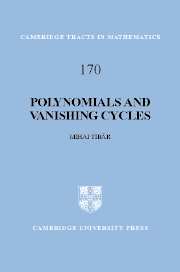Book contents
- Frontmatter
- Contents
- Preface
- PART I Singularities at infinity of polynomial functions
- 1 Regularity conditions at infinity
- 2 Detecting atypical values via singularities at infinity
- 3 Local and global fibrations
- 4 Families of complex polynomials
- 5 Topology of a family and contact structures
- PART II The impact of global polar varieties
- PART III Vanishing cycles of nongeneric pencils
- Appendix 1 Stratified singularities
- Appendix 2 Hints to some exercises
- Notes
- References
- Bibliography
- Index
4 - Families of complex polynomials
from PART I - Singularities at infinity of polynomial functions
Published online by Cambridge University Press: 29 September 2009
- Frontmatter
- Contents
- Preface
- PART I Singularities at infinity of polynomial functions
- 1 Regularity conditions at infinity
- 2 Detecting atypical values via singularities at infinity
- 3 Local and global fibrations
- 4 Families of complex polynomials
- 5 Topology of a family and contact structures
- PART II The impact of global polar varieties
- PART III Vanishing cycles of nongeneric pencils
- Appendix 1 Stratified singularities
- Appendix 2 Hints to some exercises
- Notes
- References
- Bibliography
- Index
Summary
By deformation of the polynomial function f we mean a family of polynomial functions fs(x) = P(x,s) such that f0 = f, where P : ℂn × ℂk → ℂ and the parameter s varies in a small neighbourhood of 0 ∈ ℂ. We shall assume that our family depends holomorphically on the parameter s ∈ ℂk (unless otherwise stated). There is a well-defined general fibre Gs of the polynomial function fs, since we have seen that the set of atypical values Atyp fs is a finite set. When specializing fs to f0, the topology of the general fibre may change, and the number of atypical values may vary. First we prove some general results on the topology, then we focus on the transformation of the set of singularities Singf ⋃ Sing ∞f in the neighbourhood of infinity, and finally we give a criterion for the topological triviality of a family.
Deformations to general hypersurfaces
Definition 4.1.1 We say that an affine hypersurface Y ⊂ ℂn of degree d is general if its projective closure is nonsingular and transverse to the hyperplane at infinity H∞ = ℙn \ ℂn.
Any hypersurface Y = X0 ⊂ ℂn (say of degree d ≥ 2) can be deformed in a constant degree family {Xs}s∈δ such that Xs is general for s ≠ 0. Indeed, let Y := {f = 0} and let fs = (1 – s) f + s (gd – 1), where. The deformation fs is linear in s.
- Type
- Chapter
- Information
- Polynomials and Vanishing Cycles , pp. 53 - 69Publisher: Cambridge University PressPrint publication year: 2007



